Special Sessions
- MAIN TRACK
- SS_01 Efficiency-Driven Manufacturing: Tools and Trends in the Era of Industry 4.0
- SS_02 Intersecting quality management and mechanical design for manufacturing sustainability
- SS_03 Human factors in manufacturing
- SS_05 Circularity in advanced production systems: materials, methods, and digital transformation
- SS_07 Smart Manufacturing & Sustainability: Interdisciplinary Approaches in the Era of Industry 4.0/5.0
- SS_10 From Additive Manufacturing to Healthcare Innovation through Digital Transformation in Biomedical Engineering
- SS_11 Intelligent adaptive systems in integrated production management processes
- SS_12 Intelligent Solutions for Industry of the Future
- SS_13 Grey Systems Modeling for Engineering Solutions and Business Optimization
- SS_14 Intelligent Methods Supporting Manufacturing Systems Efficiency
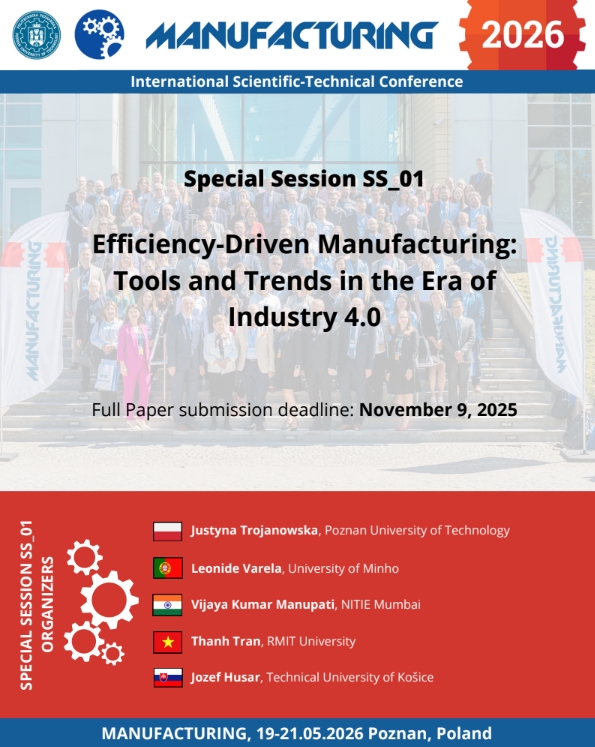
Special Session SS_01
- Digital Twins in Production Optimization
- AI-Based Predictive Maintenance in Manufacturing Systems
- Real-Time Data Analytics for Process Efficiency
- Integration of IoT Devices in Smart Factories
- Cyber-Physical Systems for Adaptive Manufacturing
- Machine Learning Applications
- Augmented Reality (AR) for Operator Support and Training
- Simulation and Virtual Commissioning of Production Lines
- KPI-Driven Decision Support Systems in Industry 4.0
- Advanced Production Planning and Scheduling in Digital Environments
ORGANIZERS
Justyna Trojanowska, Poznan University of Technology
Leonilde Varela, University of Minho
Vijaya Kumar Manupati, NITIE Mumbai
Thanh Tran, RMIT University
Jozef Husar, Technical University of Košice
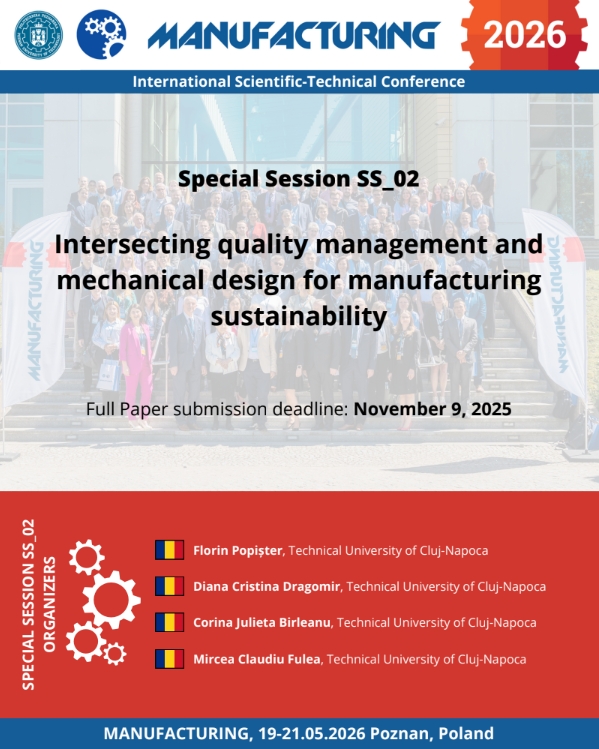
Special Session SS_02
- Human–robot/machine interaction/collaboration
- Robot-assisted manufacturing processes and computational methods
- Artificial intelligence and digital twins in production engineering
- CAD/CAM, 3D printing, Tribology
- Advanced techniques for sustainable manufacturing
- Scientific insights into product design and manufacturing, Smart and advanced novel techniques in manufacturing
- Modeling and simulation of products in medical engineering
- Biomaterials are used in medical engineering
- Digitalization in production engineering
- Quality management
ORGANIZERS
Florin Popișter, Technical University of Cluj-Napoca
Diana Cristina Dragomir, Technical University of Cluj-Napoca
Corina Julieta Birleanu, Technical University of Cluj-Napoca
Mircea Claudiu Fulea, Technical University of Cluj-Napoca
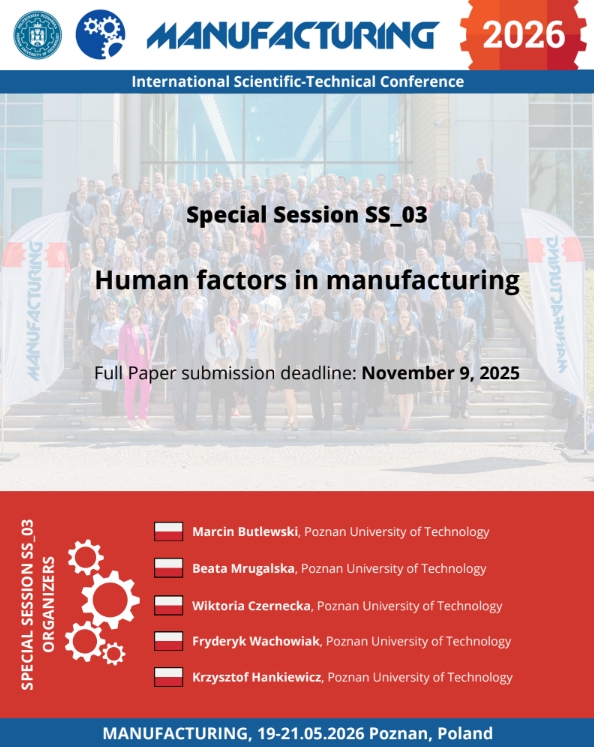
Special Session SS_03
- Aging Workforce in Manufacturing
- Challenges for the Human Role in the Context of AI
- Digital Ergonomics in Smart Manufacturing
- Ergonomics and Inclusivity in Industrial Settings
- Ergonomics in Sustainability and ESG Context
- Ergonomics Management in Production Systems
- Human-Centric Production Processes
- Human-Machine Collaboration in Industry 4.0 and 5.0
- Inclusive Design and Workplace Adaptations for Diverse Workforce
- Systemic Approaches to Ergonomics in Manufacturing Organizations
ORGANIZERS
Marcin Butlewski, Poznan University of Technology
Beata Mrugalska, Poznan University of Technology
Wiktoria Czernecka, Poznan University of Technology
Fryderyk Wachowiak, Poznan University of Technology
Krzysztof Hankiewicz, Poznan University of Technology
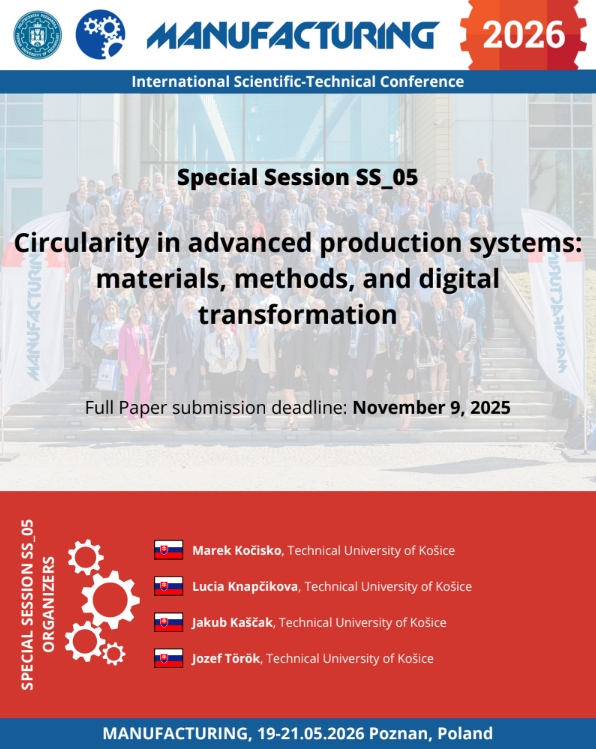
Special Session SS_05
- Circular design and closed-loop production systems
- Recycled and bio-based polymers for filament and part manufacturing
- Additive manufacturing strategies supporting circular economy goals
- Hybrid and reconfigurable manufacturing systems
- Process efficiency in high-variability, low-repeatability environments
- Quality assurance and lifecycle tracking in circular production
- Digital transformation for sustainable manufacturing operations
- Flexible automation for circular workflows
- Role of digital tools in enabling human–machine collaboration in circular contexts
ORGANIZERS
Marek Kočisko, Technical University of Košice
Lucia Knapčikova, Technical University of Košice
Jakub Kaščak, Technical University of Košice
Jozef Török, Technical University of Košice
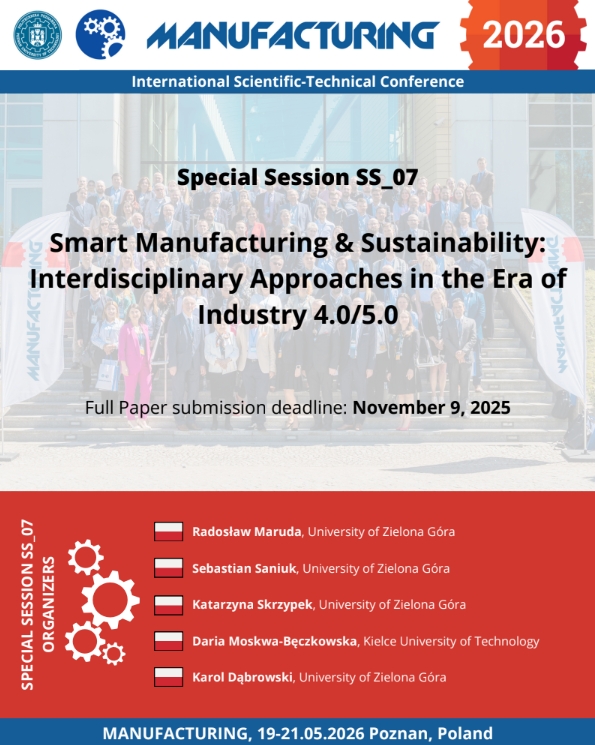
Special Session SS_07
- Modern technological processes in the context of Industry 4.0 and 5.0
- High-performance machining and sustainability in a manufacturing company
- Application of environmentally friendly cooling methods in machining
- Business management in the era of Industry 4.0 and 5.0: challenges and adaptation strategies
- Sustainability and innovation in manufacturing enterprises
- Sustainability in manufacturing – challenges, strategies, constraints and implementation
- The role of artificial intelligence and machine learning in industrial processes optimising
- Economic aspects of implementing Industry 4.0 and 5.0 technologies
- Industry 5.0 technologies – man in the centre of the manufacturing process, personalisation, human-machine collaboration
- Integration of digital solutions in sustainable supply chains
ORGANIZERS
Radosław Maruda, University of Zielona Góra
Sebastian Saniuk, University of Zielona Góra
Katarzyna Skrzypek, University of Zielona Góra
Daria Moskwa – Bęczkowska, Kielce Univerisity of Technology
Karol Dąbrowski, University of Zielona Góra
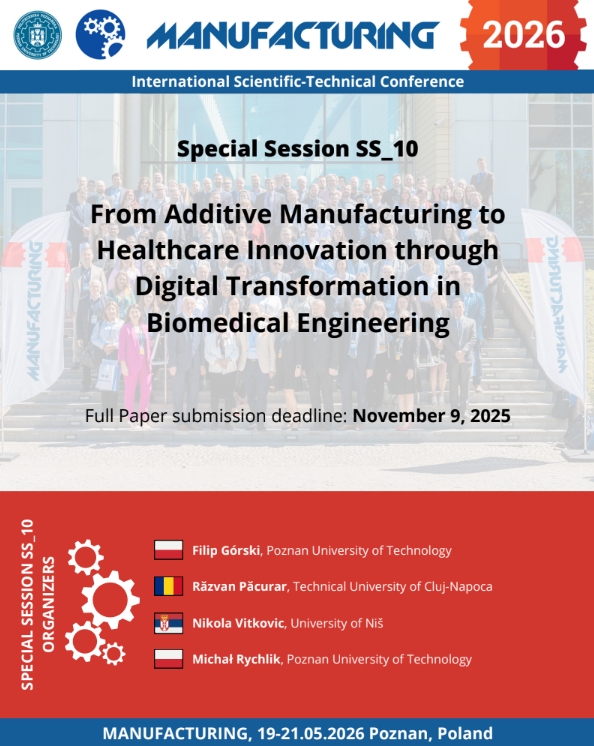
Special Session SS_10
- Digital design of patient-specific medical devices using CAD, AI-assisted modeling, and topology optimization techniques
- Processing and integration of medical imaging, 3D scanning, and data-driven methods for personalized diagnostics and treatment planning
- Additive manufacturing, bioprinting, and hybrid fabrication processes for biomedical applications
- Intelligent automation and digital workflows for the customization and on-demand production of medical products
- Advanced materials for additive manufacturing in medicine, including multi-materials, bioactive compounds, and smart/hybrid materials
- Simulation, validation, and performance analysis of digitally manufactured medical structures and implants
- Virtual Reality (VR), Augmented Reality (AR), Mixed Reality (MR), Extended reality (XR) technologies in surgical planning, medical training, and device visualization
- Experimental and computational methods for characterization and testing of 3D-printed biomedical components
- Integration of sensors, electronics, and digital interfaces into biomedical devices for personalized monitoring and therapy
- Interdisciplinary approaches combining biomedical engineering, digital tools, and clinical needs for healthcare innovation
ORGANIZERS
Filip Górski, Poznan University of Technology
Răzvan Păcurar, Technical University of Cluj-Napoca
Nikola Vitkovic, University of Niš
Michał Rychlik, Poznan University of Technology
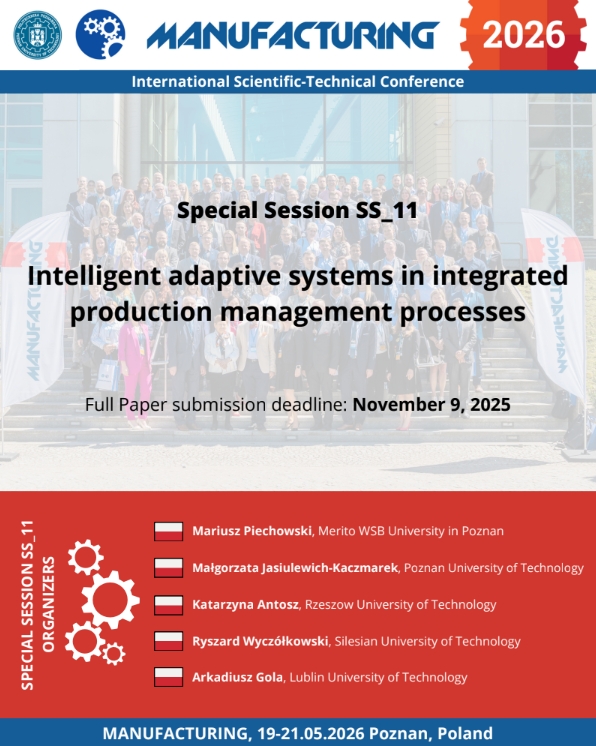
Special Session SS_11
- Utilization of adaptive decision systems in integrated production, operational, and logistics processes.
- Utilization of AI models for balancing production processes.
- Integration of multi-agent systems and edge technologies in flexible adaptive control.
- Utilization of innovative data acquisition systems for prescriptive analysis and predictive maintenance strategies.
- Self-organizing and self-adapting production systems based on bionic approaches.
ORGANIZERS
Mariusz Piechowski, Merito WSB University in Poznan
Małgorzata Jasiulewich-Kaczmarek, Poznan University of Technology
Katarzyna Antosz, Rzeszow University of Technology
Ryszard Wyczółkowski, Silesian University of Technology
Arkadiusz Gola, Lublin University of Technology
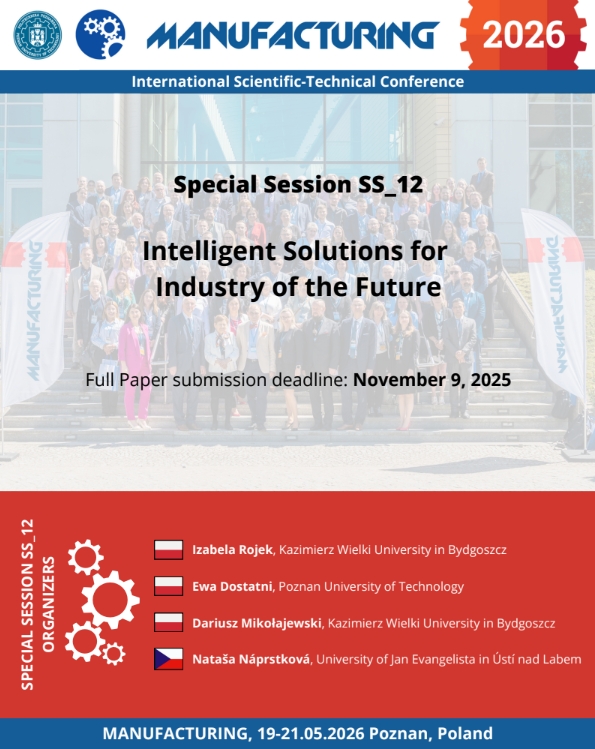
Special Session SS_12
- Monitoring Systems and Sensors, Industrial Internet of Things
- Databases & knowledge management
- Modelling & Simulation & Digital Twins
- AI-based industrial data analysis and decision support systems
- Intelligent Supply Chain Management
- Intelligent optimization of production processes & ERP
- 3D printing/Additive Manufacturing, Reverse engineering
- Green Production, Sustainability, Eco-design & LCA
- Innovative thinking & Intelligent design, Intelligent materials
- Human-centric industry
ORGANIZERS
Izabela Rojek, Kazimierz Wielki University in Bydgoszcz
Ewa Dostatni, Poznan University of Technology
Dariusz Mikołajewski, Kazimierz Wielki University in Bydgoszcz
Nataša Náprstková, University of Jan Evangelista in Ústí nad Labem
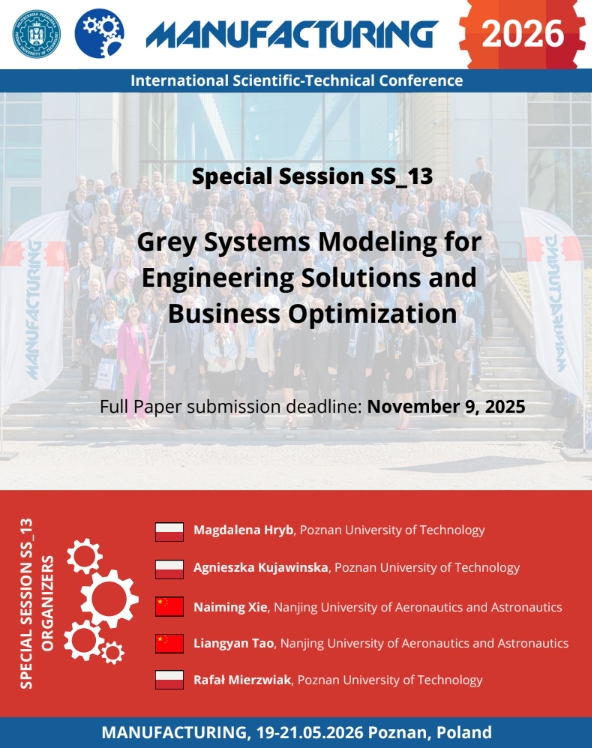
Special Session SS_13
- Grey relational analysis for quality control
- Grey prediction models in manufacturing systems
- Grey forecasting for business performance
- Grey models for supply chain optimization
- Grey systems for operational efficiency analysis
- GST-based production scheduling under uncertain capacity constraints
ORGANIZERS
Magdalena Hryb, Poznan University of Technology
Agnieszka Kujawińska, Poznan University of Technology
Naiming Xie, Nanjing University of Aeronautics and Astronautics
Liangyan Tao, Nanjing University of Aeronautics and Astronautics
Rafał Mierzwiak, Poznan University of Technology
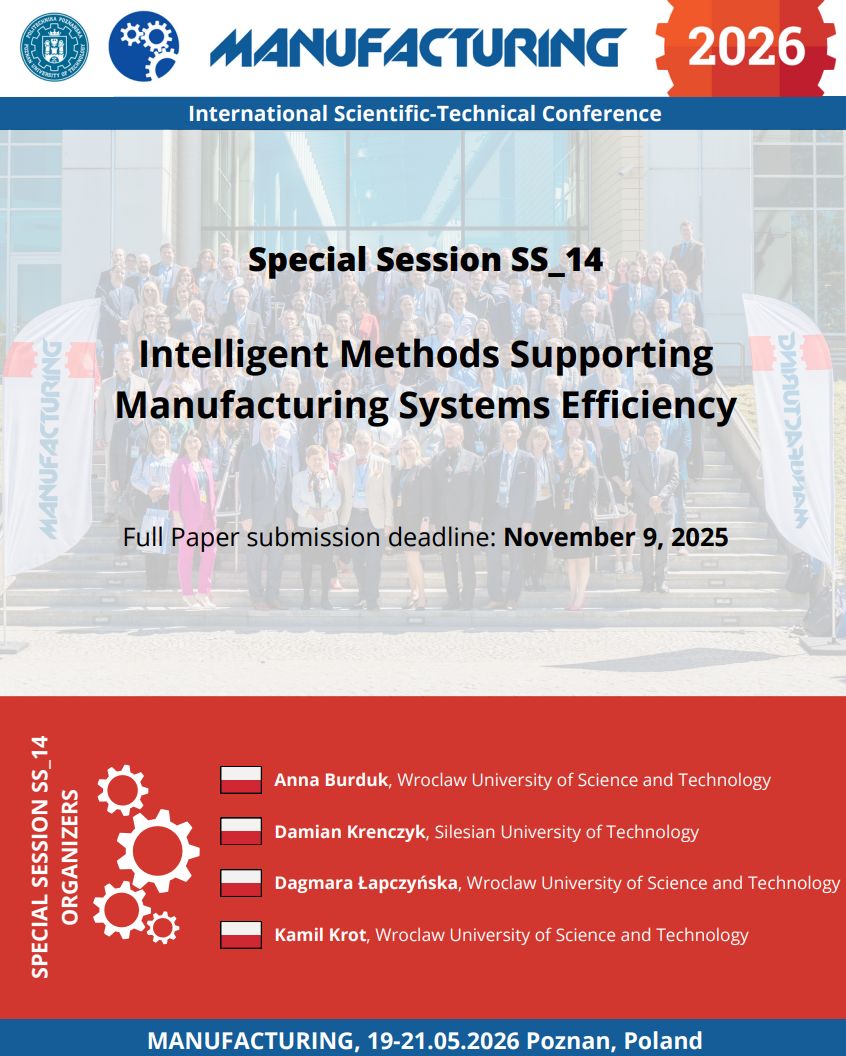
Special Session SS_14
- Intelligent Methods in Modelling and Design
- Intelligent Methods in Robotics
- Intelligence Methods in Production Planning and Scheduling
- Intelligent Methods in Control and Supervision
- Risk assessment in production systems
- Applications of Intelligent Methods and Systems in Production
- Hybrid intelligence systems
- Machine Learning
- Fuzzy approaches
- Data Mining
ORGANIZERS
Anna Burduk, Wroclaw University of Science and Technology
Damian Krenczyk, Silesian University of Technology
Dagmara Łapczyńska, Wroclaw University of Science and Technology
Kamil Krot, Wroclaw University of Science and Technology

